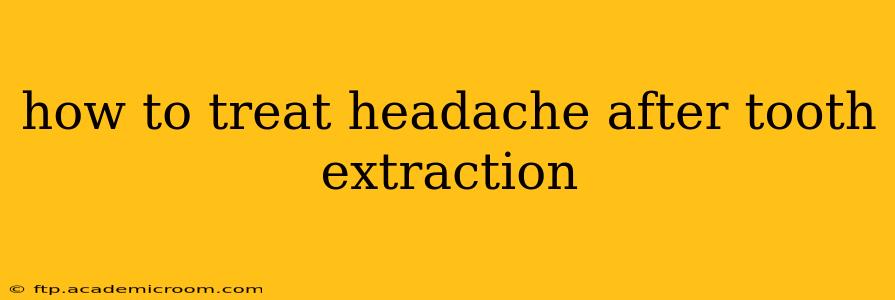A throbbing headache after a tooth extraction is a common experience, often stemming from the procedure itself or the medication used. While usually mild and temporary, understanding how to manage it effectively is crucial for a comfortable recovery. This guide will explore various methods to alleviate post-extraction headaches and when to seek professional help.
What Causes Headaches After Tooth Extraction?
Several factors can contribute to a post-extraction headache:
- Inflammation and Swelling: The surgical site undergoes significant inflammation, which can cause pressure and pain radiating to the head. This is a natural part of the healing process.
- Medication Side Effects: Pain relievers like ibuprofen or codeine can sometimes cause headaches as a side effect.
- Sinus Pressure: Extractions in the upper jaw can sometimes affect the sinuses, leading to pressure and headaches.
- Dry Socket: A painful condition where the blood clot at the extraction site dislodges, exposing the bone and nerves. This can cause severe pain radiating to the head. (Note: This is a more serious complication and requires immediate dental attention.)
- Underlying Medical Conditions: Pre-existing conditions like migraines or tension headaches can be exacerbated by the stress of a tooth extraction.
How to Relieve a Headache After Tooth Extraction?
Managing the headache involves a multifaceted approach focusing on both the pain and the underlying causes:
1. Following Post-Extraction Instructions:
This is the most critical step. Your dentist will provide specific instructions, including:
- Proper medication use: Adhere strictly to the prescribed pain medication dosage and schedule.
- Ice application: Applying ice packs to the affected area can reduce swelling and pain, limiting headache intensity. Follow the dentist's recommendation on application frequency and duration.
- Gentle rinsing: Gently rinsing your mouth with saltwater can help keep the extraction site clean and promote healing, potentially reducing inflammation that contributes to headaches.
- Avoiding strenuous activity: Physical exertion can increase blood flow and swelling, exacerbating pain and headaches. Rest is essential.
2. Over-the-Counter Pain Relief:
Your dentist may recommend additional over-the-counter pain relievers alongside prescribed medications. Always consult them before taking anything additional. Common options include:
- Ibuprofen (Advil, Motrin): An effective anti-inflammatory and pain reliever.
- Acetaminophen (Tylenol): Helps reduce pain and fever but lacks anti-inflammatory properties.
Important Note: Never exceed the recommended dosage of any medication.
3. Rest and Relaxation:
Getting enough rest is crucial for healing and pain management. Stress can exacerbate headaches, so prioritizing rest and relaxation techniques can prove beneficial. Consider:
- Getting sufficient sleep: Aim for at least 7-8 hours of quality sleep per night.
- Practicing relaxation techniques: Techniques like deep breathing exercises or meditation can help alleviate stress and reduce pain.
4. Hydration:
Staying adequately hydrated is essential for overall health and can assist in reducing inflammation. Drink plenty of water throughout the day. Avoid using a straw as the suction can dislodge the blood clot.
5. Diet:
Eat soft foods that are easy to chew and swallow to avoid further irritating the extraction site. Avoid hot or acidic foods and beverages, as these can worsen pain and discomfort.
When to See a Dentist
While most post-extraction headaches are mild and temporary, some situations require immediate dental attention:
- Severe or persistent pain: If the pain is unmanageable despite following the prescribed medication and care instructions.
- Signs of infection: Including increased swelling, redness, fever, or pus.
- Dry socket: This painful complication requires immediate professional intervention. Symptoms include severe pain several days after the extraction, a bad taste in the mouth, and a visible empty socket.
Can a headache after tooth extraction be a sign of something more serious?
Yes, while most post-extraction headaches are benign, a persistent or severe headache could indicate a more serious complication like dry socket or infection. It's crucial to contact your dentist immediately if you experience severe pain, persistent swelling, fever, or other signs of infection.
How long will my headache last after a tooth extraction?
The duration of the headache varies depending on several factors, including the complexity of the extraction, individual healing rates, and adherence to post-operative instructions. Most headaches resolve within a few days, but some may persist for a week or longer.
What over-the-counter medications can I take for a headache after a tooth extraction?
Consult your dentist before taking any additional medications. Generally, ibuprofen (Advil, Motrin) or acetaminophen (Tylenol) are suitable options for mild to moderate pain, but always follow your dentist's recommendations.
By following these guidelines, you can effectively manage headaches after a tooth extraction and ensure a smoother recovery. Remember to always consult your dentist if you have concerns or experience persistent or worsening symptoms. They are the best source of information and guidance for your specific situation.
